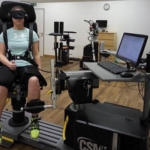Mobility specialists looking to quit profession
Study reveals a third of orthotists working privately and in NHS seek a way out.

An orthotist at Shriners Hospital for Children—Twin Cities works on a custom device. Photo courtesy of Shriners Hospital for Children, Twin Cities. An orthotist at Shriners Hospital for Children—Twin Cities works on a custom device. Photo courtesy of Shriners Hospital for Children, Twin Cities. Lower Extremity Review
Jamie Forsyth, Anglia Ruskin University 9 January 2023
More than a third of orthotists, specialists who improve quality of life for people with long term conditions and disabilities, would leave the profession if they could, according to a new study.
Orthotists provide gait analysis to patients and design and fit external devices. These include insoles, braces and splints, to support and improve posture, function and mobility and manage pain and deformity.
However, new research by Anglia Ruskin University (ARU) has found that 37% of orthotists working with NHS and private patients would leave the orthotic profession if they could, suggesting a potential retention crisis. The figure was roughly the same among those employed by the NHS and those employed by private companies.
Around 70% of orthotists in the UK work in NHS settings but are employed by private companies. The research found that the leading reason for orthotists wanting to leave the profession was treatment by their employer. Many respondents also reported they did not have enough time with patients during appointments, and that facilities were inadequate. Privately employed orthotists reported that their working conditions were significantly lower than those employed by the NHS.
Orthotic services provide financial value to the NHS. A previous report by the NHS Purchasing and Supply Agency found that the health service could save £4 for every £1 spent on improving orthotics services, because patients who access these services suffer fewer falls and require less pain relief or surgical interventions.
Orthotics services provide treatment options for people with a wide range of conditions and orthotists work closely with a number of clinical specialties within the NHS including diabetes care, elderly medicine, neurology, orthopaedics, paediatrics, stroke and trauma teams.
Dr Nebil Achour, co-author of the paper and Associate Professor in Disaster Mitigation at Anglia Ruskin University (ARU), said:
“This study highlights the substantial challenges facing the orthotic profession in terms of staff satisfaction and retention. The perception among orthotists that they were treated poorly by their employer appears to be the catalyst for a significant number wishing to leave not just their job but the profession overall. This is a vulnerability in our healthcare sector and needs to be addressed urgently.
“A resilient healthcare sector requires all professions and capabilities to be ready to respond effectively during times of adversities.”
Lead author Katie Prosser, who carried out the research while studying for a Masters Degree in Healthcare Management at ARU, said:
“These are concerning results with clear and considerable implications for the future of the orthotic workforce, as well as patients requiring their services. Usually if people are dissatisfied with an NHS post they can look to move into private roles. However, in this profession it appears there is little to be gained in terms of job satisfaction or conditions by doing this, which may lead orthotists to want to do something else entirely.”
The peer-reviewed study has been published in the British Journal of Healthcare Management.
![]() Source Anglia Ruskin University via EurekAlert! AAAS
Source Anglia Ruskin University via EurekAlert! AAAS
| References |
Job satisfaction among NHS and private orthotists: a cross-sectional comparative study, Katie Prosser, Nebil Achour. Br. J. Health Care Manag. Vol. 29, No. 1. 5 Jan 2023 https://doi.org/10.12968/bjhc.2021.0081.
| Further reading |
How has the COVID-19 pandemic affected orthotic services in the United Kingdom? Eddison N, Healy A, Chockalingam N. Prosthet Orthot Int. 2021 Oct 1;45(5):373-377. doi: 10.1097/PXR.0000000000000031.
Regulation of the global orthotist/prosthetist workforce, and what we might learn from allied health professions with international-level regulatory support: a narrative review, Clarke L, Puli L, Ridgewell E, Dillon MP, Anderson S. Hum Resour Health. 2021 Jul 15;19(1):83. doi: 10.1186/s12960-021-00625-9. Full text, PDF
An exploratory qualitative study of health professional perspectives on clinical outcomes in UK orthotic practice, Hall N, Parker D, Williams A. J Foot Ankle Res. 2020 Jul 29;13(1):49. doi: 10.1186/s13047-020-00416-w. Full text, PDF
Cross-sectional survey of orthotic service provision in the UK: does where you live affect the service you receive? Chockalingam N, Eddison N, Healy A. BMJ Open. 2019 Oct 24;9(10):e028186. doi: 10.1136/bmjopen-2018-028186. Full text, PDF






